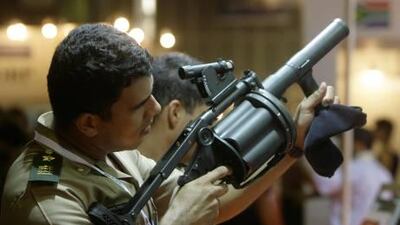UNITED NATIONS // Calling it a "disgrace" that there is no international agreement regulating global arms sales, the UN secretary-general Ban Ki-moon yesterday opened a month-long conference that aims to negotiate one to curb black markets and deny weapons to repressive regimes, terrorists and nations at war.
"It is ambitious, but I believe it is achievable," Mr Ban told the delegates in New York representing more than 150 countries. "Our common goal is clear."
Such unregulated weapons kill 1,500 people each day, up to 750,000 a year, according to Amnesty International USA.
The proposed Arms Trade Treaty, in the works for six years, requires 65 nations to ratify it before it is legally binding on those countries.
It would cover all conventional weapons, from small arms to tanks, warships and missile systems. It would require ratifying countries to regulate imports, exports and weapons passing through their territories. Countries would have to publish their sales yearly and register arms brokers, according to the draft treaty.
Unlike the Nuclear Non-Proliferation Treaty, which created the International Atomic Energy Agency to enforce it, no country wants a treaty that creates an international arms regulatory agency to enforce it, analysts said. Instead, nations should determine which buyers are rights abusers ineligible for arms sales, and which are not, the draft treaty says.
This would allow the US, for instance, to continue selling arms to Israel, and Russia to continue supplying Syria.
It would also allow GCC countries, which have taken a low profile leading up to the conference, to arm the Syrian rebels, for example.
The treaty asks countries to decide on sales, based on certain criteria. Arms deals contributing to human-rights violations, including terrorism, genocide or other war crimes, should not be authorised.
Other criteria include whether arms would undermine peace or prolong a conflict, be diverted to the black market, hurt the economy of the purchasing nation or if the sale involved corruption.
"We want a golden rule telling governments that arms transfers under consideration would be subject to a rigorous risk assessment and, if there is a substantial risk that the arms are likely to be used for serious violations of international human rights law, then those transfers would not be permitted," said Brian Wood, Amnesty International's manager of arms control.
Tom Countryman, an assistant secretary of state and the chief US delegate, said it would compel countries that had no regulatory system to put one in place. Only 52 countries regulate their arms sales, according to Oxfam.
Treaty proponents believe that creating national regulations in countries where they do not exist could close loopholes in the international system that rogue arms dealers have exploited for years.
Analysts say this could lead to "naming and shaming" countries that violate the treaty, but there is little in the draft to prevent governments from falsifying their records, unless another nation complains.
While the necessary 65 countries were expected to approve a version of the treaty by the month's end, there are several nations that remain sceptical, analysts said.
"African nations are deeply uncomfortable about revealing information about their weapons purchases," said one analyst. But seeing the havoc that conventional arms have wrought on the continent, African nations want greater controls on their imports, he added.
China initially was sceptical but has come around since their African trading partners said they favoured greater regulation, analysts said. Chinese diplomats, however, are arguing that weapons given as "gifts" should be allowed outside of the treaty.
Other countries said to be sceptical of the treaty are net importers Egypt, Sudan and Russia. The UAE Mission to the UN did not return a phone call seeking comment.
The conference began two days late after a diplomatic row over whether the Palestine Territories could be seated with other voting states. After the US and Israel threatened to boycott the conference, a compromise was reached to have the Palestinian delegate sit in the front row as an observer without voting rights.

